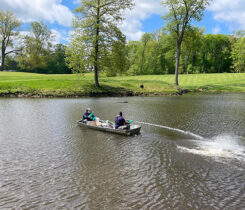University’s golf course receives Audubon recognition
NC State University officials have announced its Lonnie Poole Golf Course has passed strict sustainability standards to become a certified Audubon International Signature Golf Sanctuary and member of the organization’s Signature Program. The golf course joins Kansas State University’s Colbert Hills Golf Course as the only two university properties in the world to earn this certification, according to the school.

The Lonnie Poole Golf Course was recently named a certified Audubon International Signature Golf Sanctuary.
(Photo courtesy NC State University.)
The Lonnie Poole Golf Course is located on NC State’s Centennial Campus. Due to careful planning to fit managed turfgrass seamlessly into the surrounding environment, it follows Audubon International’s mission of practicing responsible management of land, water, wildlife, and other natural resources. The golf course also serves as a “living lab” for sustainable turfgrass management and environmental stewardship.
Danesha Seth Carley, sustainability program coordinator for the NC State College of Agriculture and Life Sciences, was involved with the planning and construction of the golf course and said Audubon International certification was always the goal.
“The success of the golf course industry transition towards sustainability will depend, ultimately, on changing the awareness of sustainability issues within the industry and its clientele,” Carley said. “Everyone must understand the relationship between their everyday lives and the resources on which they depend. This course is specifically designed to uphold these sustainability elements.”
Charles Peacock, a professor in NC State’s crop science department, emphasized that the Signature Program is an “elite” Audubon International category. Peacock, who has worked for the past 15 years with close to 200 different signature projects worldwide, said that only new locations are considered for Signature Program membership. There are only 92 other Signature Sanctuaries in the world.

The natural vegetative buffers are a distinguishing feature of the course. (Photo courtesy NC State University.)
One of the golf course’s distinguishing features is the extensive, undisturbed vegetative buffer areas. These buffers include mixtures of fine-fescues, native warm-season grasses, loblolly pines, American beautyberry and butterfly weed. It is not uncommon for golfers to see deer, beaver, and even foxes during a round, despite being surrounded by the city of Raleigh.
“These buffers were integral to the design and were a big part of what allowed us easy Audubon International certification,” Carley said.
Tom Rufty, a professor in NC State’s Crop Science department, helped lead the initial push for Audubon International certification during the Lonnie Poole Golf Course construction in 2007. Rufty said the golf course maintenance staff, led by Superintendent Brian Green, were key in the installation of the adapted plants and overall turf maintenance.
“The staff are aware of the importance of environmental protection and the distinction of the Audubon Program,” Rufty said.
Another winning feature is the surrounding constructed wetlands.
“Wetlands are natural water filters,” Carley said, citing research from NC State that the constructed wetlands provide many ecological benefits. “The biological, chemical, and physical conditions within wetlands create ideal conditions for removing many pollutants from water.”










